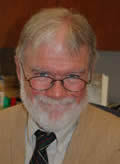
It was a celebration of many things: Of the three-decade-long career of a pro-life leader, of an academic institution’s rededication to the defense of society’s most vulnerable, and of a new and conspicuous way to honor such commitments.
But Thursday evening’s ceremonies on the Notre Dame campus, when Richard Doerflinger, associate director of the United States Conference of Catholic Bishops (USCCB) Secretariat for Pro Life Activities, received the inaugural Evangelium Vitae Medal, seemed also to anticipate the much larger celebration of Pope John Paul II’s beatification. That would take place in Rome three days later.
The Evangelium Vitae Medal, established last year by the Notre Dame Fund to Protect Human Life, commemorates Pope John Paul’s eponymous 1995 encyclical letter by annually honoring “individuals whose outstanding efforts have served to proclaim the Gospel of Life by steadfastly affirming and defending the sanctity of human life from its earliest stages.”
According to David Solomon, William P. and Hazel B. White Director of the Center for Ethics and Culture, and chair of the fund’s governing committee, “Richard Doerflinger’s unwavering commitment and heroic witness to life on Capitol Hill and beyond make him the perfect first recipient.”
Bishop Emeritus John D’Arcy of Fort Wayne-South Bend began the celebration by praising that witness in a homily during Mass in the Basilica of the Sacred Heart. Doerflinger’s work for the Catholic bishops has necessitated frequent and sometimes controversial testimony before Congress, the National Bioethics Advisory Commission, the National Institutes of Health, the President’s Council on Bioethics, and several state legislatures on ethical issues involving abortion, physician-assisted suicide, euthanasia, human embryo research and cloning.
Bishop D’Arcy recommended these efforts as a response to Pope John Paul’s summons to “take up with courage a confrontation with the culture” and reminded all present the special urgency of that summons for Catholic universities like Notre Dame.
The medal, which was presented to Doerflinger later that evening at a Monogram Room banquet, also seemed reverborative with the beatification of Evangelium Vitae’s author. Designed by Notre Dame architect Duncan Stroik and his associate, Thomas Stroka, its obverse side features a portrait of Pope John Paul II encircled by a Latin inscription taken from the encyclical’s concluding prayer: “Civilem Veritatis Amorisque Cultum Extrudere” (“to build the civilization of truth and love”).
Extolling Doerflinger’s advocacy for human life in its most vulnerable stages, the inaugural Evangelium Vitae citation noted how “in the face of many challenges and much criticism, you have heeded Pope John Paul II’s exhortation that in proclaiming the Gospel of Life ‘we must refuse any compromise or ambiguity which might conform us to the world’s way of thinking.’”
Doerflinger’s acceptance remarks themselves could almost be heard as refractions of John Paul’s nonconformist imperative. Reflecting on ethical notions with which their proponents justify abortion, euthanasia, embryonic stem-cell research, he argued that “these are not really coherent ideas; they are, in fact self-defeating, and even insane. But they are what counts as worldly wisdom in too many quarters of our society.” The unborn, the exploited, the suicidal, were “victims of a revolution in modern thinking that gave us the crazy idea that it is our job to weigh different people and then decide who lives and who dies.”
Catholicism, he said, had ample resources to resist such wisdom, and its communities and institutions, including Notre Dame, are responsible for “finding and nurturing the critics and gadflies so sorely needed for a critique of today’s comfortable assumptions and bad ideas.” But that critique, he insisted, should be undertaken in the spirit “not of winning a debate but sparking a conversion, of healing an illness of the soul.”
To conclude the Evangelium Vitae Medal banquet, Rev. Wilson Miscamble, CSC, professor of history at Notre Dame, offered the Marian prayer with which Pope John Paul concluded his encyclical, pleading for the grace to celebrate, the courage to witness and the resolve to build up a civilization which revered life. Pope John Paul’s words were changed slightly in its address, “O Mary,” becoming “O Mary, Notre Dame…”
Blessed John Paul doubtless approves.
Michael Garvey is Notre Dame’s assistant director of public information and communication. Email him at garvey.2@nd.edu.